#Allied Invasion of France
Explore tagged Tumblr posts
Text


Order of the Day message delivered to Allied forces from General Dwight D. Eisenhower, Supreme Allied Commander, prior to the D-Day invasion, June 6, 1944.
#History#D-Day#D-Day + 80 Years#D-Day 80#Dwight D. Eisenhower#General Eisenhower#President Eisenhower#Military History#Order of the Day#Battle of Normandy#Invasion of Normandy#D-Day Invasion#Normandy#Normandy Landings#D-Day Landings#Allied Invasion of France#World War II#WWII#Second World War#Eisenhower's D-Day Message#Operation Overlord
160 notes
·
View notes
Text


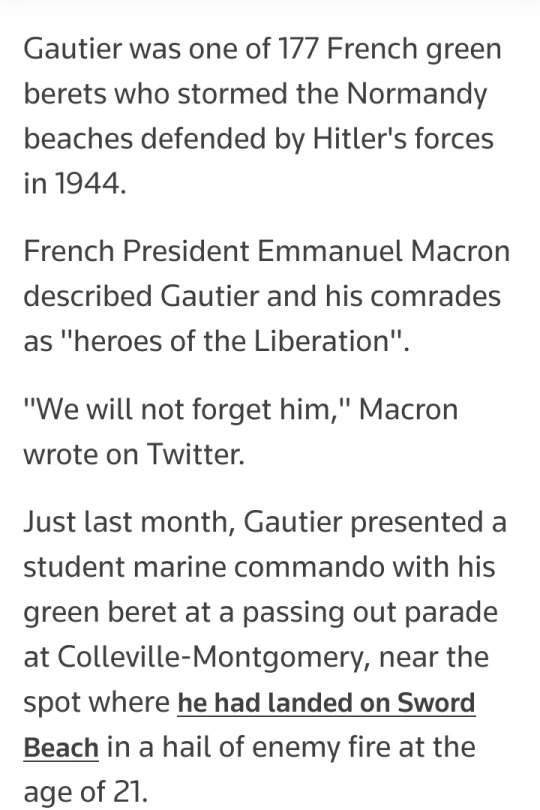



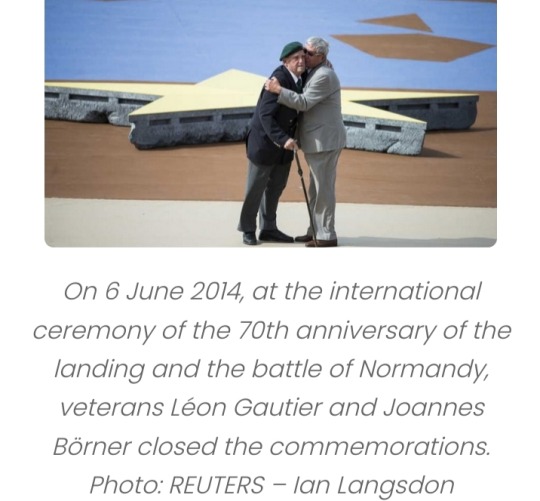
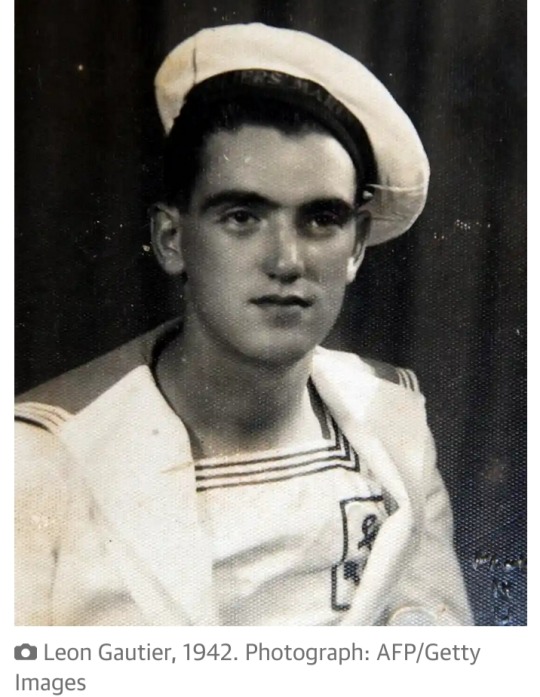
Leon Gautier (October 27, 1922 - July 3, 2023)
#Leon Gautier#D-Day#World War II#1944#Normandy#France#French green berets#Sword beach#Emmanuel Macron#General Charles de Gaulle#Free French Naval Forces#French Navy#Free French Forces#Allies#war#D-Day invasion#war veteran
54 notes
·
View notes
Text

2016 - Normandy American Cemetery and Memorial
#MYPICS#travel#europe#Normandy#WWII#WW2#France#Normandy France#American Cemetery#Normandy American Cemetery#Allied Invasion#World War II
8 notes
·
View notes
Text
On this day in 1944, the hinge of European history began to turn.
#On this day#6 June 1944#Juno Beach#France#WWII#Normandy landings#Allied invasion#British Army#Europe#Operation Overlord#US Army#armed forces#Canadian Army
50 notes
·
View notes
Text

Europe is rearming and they have rebuffed Trump, Vance, Rubio, and Musk. Since Putin’s invasion of Ukraine Europe has undergone its largest re-armament and modernization program in History. Every country in Western Europe, not just the NATO states, has massively increased their military budgets and some by more than 5 times their pre-invasion spending. Poland has also constructed massive military fortifications along their border with Belarus and Russia that would make a Russian ground invasion collapse or at least grind to a halt indefinitely.
Putin’s military is shattered and has nearly run out of arms, ammunition, and supplies. They have lost nearly a million dead and wounded. The Russian army has proved to be disastrously incompetent and ill equipped. They are relying on conscripts, convicts, and mercenaries. They’ve been supplemented by North Koreans that are even less trained and motivated and are arriving without equipment and riddled with diseases.
Russia has proven it does not have the ability to defeat Ukraine or even a single NATO state, let alone the whole alliance. NATO states have a nuke sharing agreement and even if the US pulls out France and the UK each have enough to destroy Russia many times over. The Germans are furious with the way the Trump administration has been treating them and meddling in their domestic politics. Some months back French president Macron threatened to send his own troops into Ukraine after Putin interfered in the French elections. All the members of the European Union have individually stated they are prepared to go it alone without the US. They are likely meeting now to formalize that. The European Union does not need the US as their joint economy and militaries make them nearly are equal and likely soon to be our superior.
They are not going to be brow beaten into submission like so many states were by Hitler prior to the commencement of a shooting war. Canada has long had not so secret military discussions with both France and the UK regarding military aid should a rogue US administration try to invade them or engage in economic hostilities. It’s commonly known among educated Canadians and there have even been Canadians novels loosely based on this.
Now it may seem like our allies are well prepared and planning for the worst but there are flies in the ointment. The greatest variable is that Putin is a nut job who can only hold power by launching military operations to rally the base around him. He’s done this before every election but with his losses he’s on thinner ice than ever with his own people. He also has a stated policy of “nuclear de-escalation” which NATO officials have written about at length. What it means is he invades a territory then places tactical nukes there and then “de-escalates” by threatening to nuke anyone who tries to dislodge him. Russia hasn’t done this yet as it is a plan reserved for NATO states not his lesser neighbors.
The simple fact is that no matter how much of his power, and his nation’s power crumbles around him, he just doesn’t give a flying f—k. He knows he is a dead man the moment he loses offices so he is prepared to take the world down with him, because that’s what lunatics do.
The other variable is that Trump is an ignorant, drug-addled, madman with delusions of grandeur and dreams of being remembered as one of history’s greatest tyrants alongside Hitler, Mussolini, Tojo, Stalin, etc. Trump is currently attempting to blackmail Ukraine into giving him all of that country’s rare earth minerals that are desperately needed to produce computers, cell tech, and other advanced tech. Now since Trump is an aging idiot he was most likely informed of the need for them by Muskrat and the other tech bros. He’s also going to meet with Putin and MBS in Saudi Arabia to work on a settlement for the Ukraine war. Could you find three bigger villains? The only one missing is Xi of China who is making final preparations to invade Taiwan and seize 99% of the world’s semiconductor production. Xi knows he has Musk and Trump in his pocket and that the US will no longer defend that strategic island.
Likely Trump and Putin are planning to divide up Europe and the Americas like Hitler and Stalin divided Poland while China is given free rein in Asia like the Axis empower Japan to do in World War II. Many Americans, especially some older types, former veterans, and white supremacists have a fascination with Hitler and WWII. They saw Germany as an underdog and wondered (even wished to have seen) what would have happened had Germany won.
Something big is brewing and the European Union leaders know the time has come. Many of them are telling their press as we speak that Europe has relied on the U.S. for too long and that they wish they had increased their military budgets sooner and began their own war preparations without the U.S. as an ally or even a possible foe. The world’s biggest democracy and biggest non-aligned nation, India, also knows something is brewing and has cancelled their military contracts with Russia while placing arms orders with European countries. They are also planning to invest in creating a homegrown defense industry so they will no longer be reliant on others and better able to stand up to the endless border wars China keeps launching against them.
What we’re seeing now is extremely similar to what transpired immediately before both world wars.
In a past life I was a historian and defense analyst before a series of family tragedies forced me to step back and take a local position as an educator and part-time internet know it all. I’ve spent decades researching these things and how they are driven by politics. Nothing is carved in stone, especially when the primary bad actors are as unstable as sh-t house rats.
All the people who still do this for a living are certain that the next several months will see us devolve into a fascist dictatorship unless something dramatic happens. Dear leader passing away, losing his nerve and backing down, or grow tired of Musk upstaging him and removing the South African bastard. There’s also a slim chance he’ll be impeached if the Dems take back both houses of Congress in the mid-terms and even slimmer chance that he will be deposed by a popular uprising. He’s very erratic and not sleeping enough and switching back and forth between coke and Adderall doesn’t help, nor does his obvious cognitive decline.
Putin is more worrisome at this point as he’s slowly but steadily losing control. Xi like all his predecessors is extremely patient but he’d be blind not to see this will likely be his best chance to snatch Taiwan, albeit at a high cost when he would prefer to take it without the expense of a war. Israel, Iran, and Saudi Arabia remain total wildcards sitting in close proximity to a large part of the world’s oil. All are using proxies or are themselves client states. Israel has nukes. Iran secretly has or will shortly have them. Saudi Arabia is believed to have purchased the technology from Trump with that infamous $2 billion dollar gift to Trump’s son-in-law Jared Kushner. Empty folders of nuclear secrets at Mar-a-Lago point to this.
In summation few of the outcomes facing us are good. The world is again on the cusp of large regional wars, if not a world war. International lawlessness has already commenced and will certainly escalate. Fascism is imminent at home. The death of America as a super power and the world’s policeman is at hand. Trump’s insane tariffs, dismantling of government agencies, and removal of social safety nets will at the least cause a very large and long lasting recession if not a depression. If a depression takes root it will likely spread worldwide. A worldwide depression could lead to large scale wars as it did with WWII.
Putting lunatics in charge is going to end much worse than Trump’s first reign of terror. And remember a million Americans died that time from his incompetence. This time his people are prepared and are already wreaking havoc at an unprecedented level.
#Belarus#slava ukraini#President Zelensky#Fuck Putin#republican assholes#maga morons#crooked donald#traitor trump#republican hypocrisy#NATO
368 notes
·
View notes
Text
HEARTBREAK ON TOUR!
charles leclerc x famous!reader
summary: in which the lavender haze has been lifted. or in which america’s it couple splits.
part 1: don’t start, part 2: wtf does ET know?
faceclaim: varies but for rn madison beer
ally’s radio 📻: heavily inspired by taylor swift and joe alwyn’s breakup bc im still in mourning. a lot of tswift references 🫶


liked by italyrry, parisy/n, and 83,783 others
y/nflorals Y/N GETTING EMOTIONAL DURING THE 1 LAST NIGHT IN GLASGLOW! via loveonshow
View all 22 comments
user4 okay but the fit fire
sweetnothingy/n my show my song ❤️🩹
user5 man she even looks pretty when she cries this is not fair bruh
back2decemberl/n this was a religious experience. i nearly died
loveontourhs FRANCE GOT ROBBED.
dontblamemey/n SHE REPLACED INVISIBLE STRING WITH THE 1?? ARE YOU SHITTING ME?
leclercy/n @dontblamemeleclerc i’m gonna kms

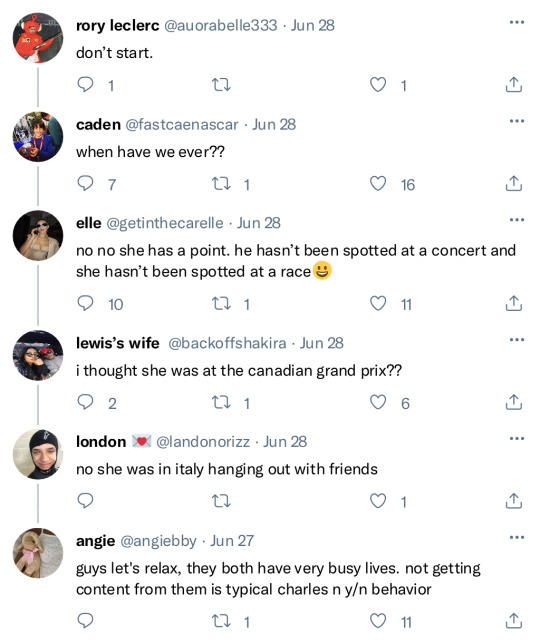

liked by haileybieber, norizzland0, and 122,728 others
enews photos caught of ‘lover’ singer #y/nl/n and #charlesleclerc fighting outside a restaurant in london tonight. click link in bio for more info on the it couple’s nasty choice of words.
View all 122 comments
arianagrande take this down immediately. please respect people’s privacy for once oml
chary/n @arianagrande ARIANA WHAT ARE U DOING HERE??
devil_leclerc this was not the family reunion i was expecting 💀
badbloody/n this feels so invasive and wrong on so many levels
trishapaytasnotreal oh this looks nasty, poor bby 🙁

liked by lewishammi,midnightrainy/n, and 608 others
lordpercevalupdates i don’t wanna scare anyone even more but…
View all 12 comments
user1 girl what
y/nmybeloved “i think i’ve seen this film before…”
charles.y/n @y/nmybeloved don’t even.
allmychampagney/n fell to my knees at walmart




ally’s radio 📻: i swear this gets better 😭 pls im a star 🙏
planning on making this a multi-series so i if u want a tag, pls lmk!! 💋.
#charles leclerc x reader#formula 1#lando norris x you#carlos sainz jr#harry styles x reader#harry styles#charles leclerc#forumla one#f1 imagine#lewis hamilton#social media blurb#scuderia ferrari#lewis hamilton x reader#charles leclerc x you#charles leclerc angst#heartbreak on tour#taylor swift#f1 wags#f1 instagram au#f1 fanfic#max verstappen#austrian gp 2023#mercedes amg f1#f1edit
3K notes
·
View notes
Photo

Utah Beach
Utah Beach was the westernmost of the five beaches attacked in the D-Day Normandy landings of 6 June 1944 and the one taken with the fewest casualties. Paratroopers were also dropped behind Utah, and despite being widely dispersed and suffering heavy casualties, they managed to secure this western flank of the invasion and liberate the first French town, Ste-Mère-Église.
Operation Overlord
The amphibious assault on the beaches of Normandy was the first stage of Operation Overlord, which sought to free Western Europe from occupation by Nazi Germany. The supreme commander of the Allied invasion force was General Dwight D. Eisenhower (1890-1969), who had been in charge of the Allied operations in the Mediterranean. The commander-in-chief of the Normandy land forces, 39 divisions in all, was the experienced General Bernard Montgomery (1887-1976). Commanding the air element was Air Chief Marshal Trafford Leigh Mallory (1892-1944), with the naval element commanded by Admiral Bertram Ramsay (1883-1945).
Nazi Germany had long prepared for an Allied invasion, but the German high command was unsure where exactly such an invasion would take place. Allied diversionary strategies added to the uncertainty, but the most likely places remained either the Pas de Calais, the closest point to British shores, or Normandy with its wide flat beaches. The Nazi leader Adolf Hitler (1889-1945) attempted to fortify the entire coast from Spain to the Netherlands with a series of bunkers, pillboxes, artillery batteries, and troops, but this Atlantic Wall, as he called it, was far from being complete in the summer of 1944. In addition, the wall was thin since there was no real depth to the defences.
Field Marshal Gerd von Rundstedt (1875-1953), commander-in-chief of the German army in the West, believed it would be impossible to stop an invasion on the coast and so it would be better to hold the bulk of the defensive forces as a mobile reserve to counterattack against enemy beachheads. Field Marshal Erwin Rommel (1891-1944), commander of Army Group B, disagreed and considered it essential to halt any invasion on the beaches themselves. Further, Rommel believed that Allied air superiority meant that movements of reserves would be severely hampered. Hitler agreed with Rommel, and so the defenders were strung out wherever the fortifications were at their weakest. Rommel improved the static defences and added steel anti-tank structures to all the larger beaches. In the end, Rundstedt was given a mobile reserve, but the compromise weakened both plans of defence.
The German response would not be helped either by their confused command structure, which meant that Rundstedt could not call on any armour (but Rommel, who reported directly to Hitler, could), and neither commander had any control over the paltry naval and air forces available or the separately controlled coastal batteries. Nevertheless, the defences were bulked up around the weaker defences of Normandy to an impressive 31 infantry divisions plus 10 armoured divisions and 7 reserve infantry divisions. The German army had another 13 divisions in other areas of France. A standard German division had a full strength of 15,000 men.
Continue reading...
294 notes
·
View notes
Text
Biden's visit has concluded. Israel has spent his entire visit trying to muddy the waters of what happened to Al Ahli Hospital and despite their cartoonish efforts, it hasn't worked

The Global South and especially West Asia know who is responsible for the bombing and no amount of AI voice recordings of 'Hamas operatives' can change that.
Israel war crimes continues to backfire on them even in America
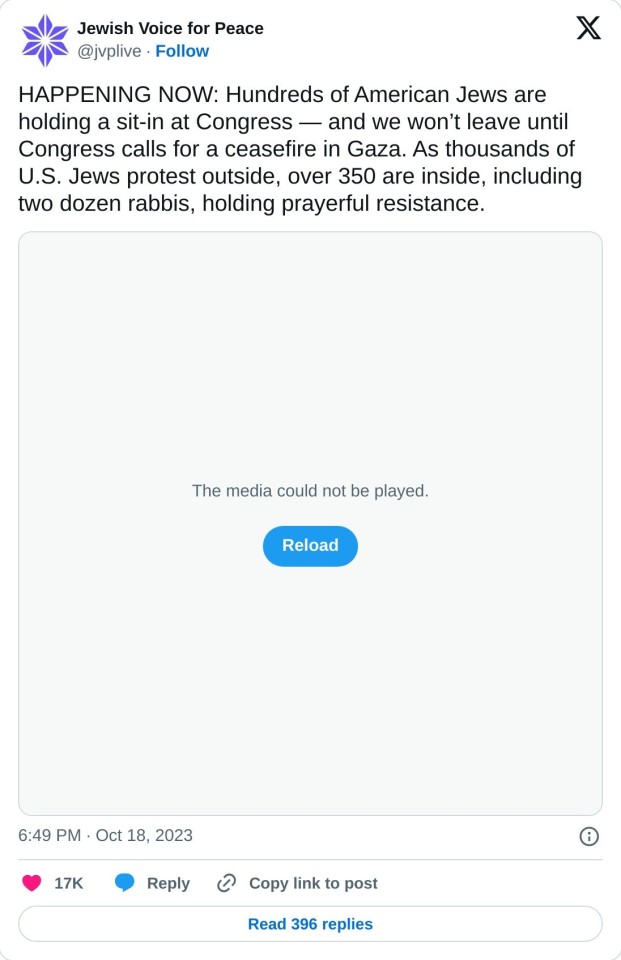
Biden backing Israel has had an impact on America's image. Here's a Wall Street Journal article warning that America's continued support is turning countries towards Russia and China which is code for turning countries against America
An EU official said that the EU will pay a heavy price in the Global South for its continued, unabashed support for Israel
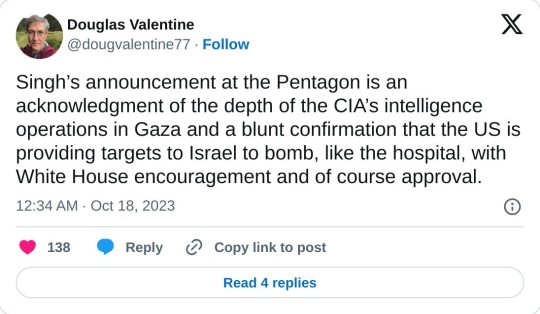
There's also speculation that the Biden administration knew about the bombing before it happened.
Countries that were/are allied with Israel continue to distance themselves from Israel like Russia. The reason I keep highlighting Russia is because the West has been running out of ammunition due to the Russia-Ukraine war and that includes Israel which is rumoured to have sent 80-90% of its ammunition to Ukraine. If this conflict lasts a long time, Israel will need to buy weapons and ammunition and Russia would be one of the countries they would turn to (same with China)
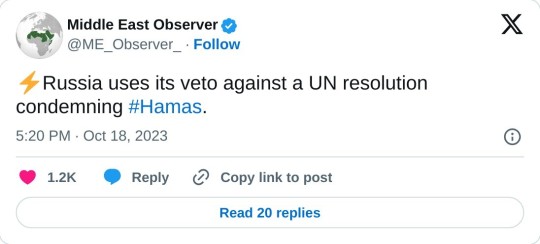
So, where are we in terms of the conflict? After days of waffling over a ground operation in Gaza, Israel postponed it until some time after Biden's visit and now we're back here again
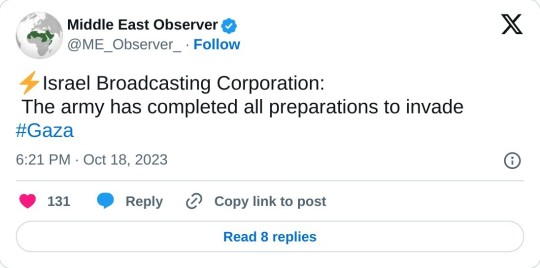

Now I'm no military expert but constantly going back and forth on whether or not you'll invade Gaza is bound to do damage to your troops' morale. No wonder they're dealing with mass desertions while their citizens demonstrate on the streets. The Israeli leadership has no plan besides bombing Gaza.
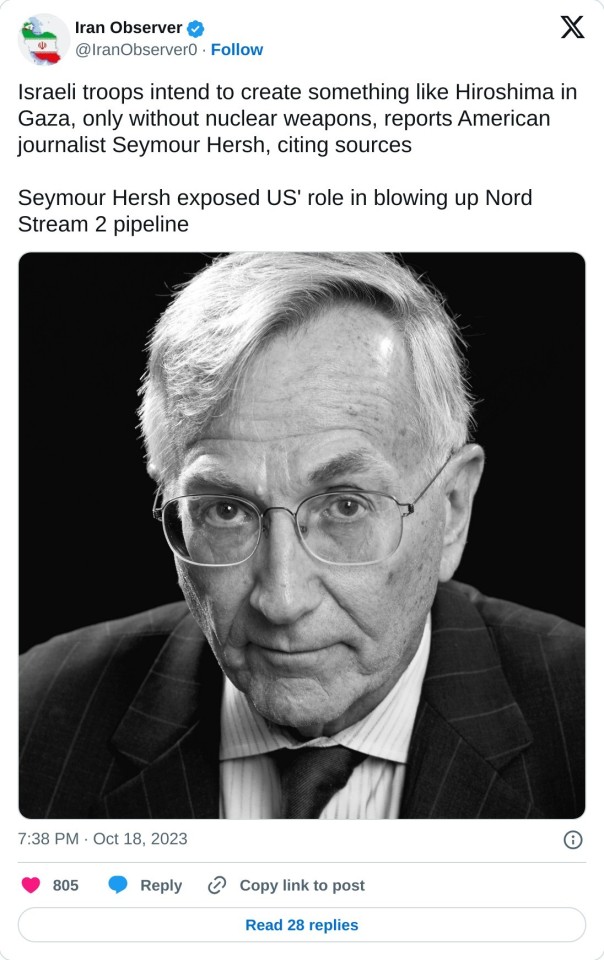
I've seen people on twitter say that the hospital bombing was done deliberately to normalise IDF soldiers to mass civilian deaths in places like hospitals, schools, places of worship, etc. I don't know if I believe that - I think they wanted to push Iran and Hezbollah's buttons before hiding behind Biden. I don't think these people are thinking strategically.
As far as the possibility of regional war is concerned, all indicators show that the West preparing for the war to escalate
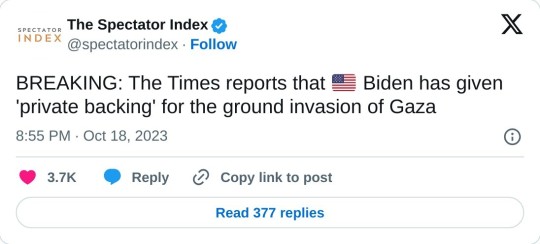

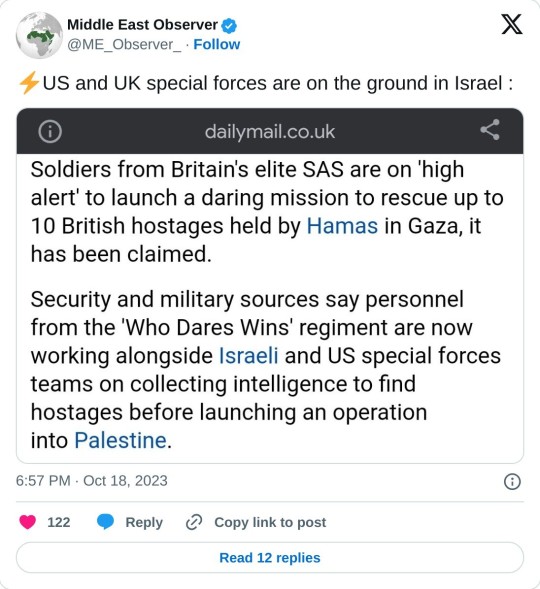
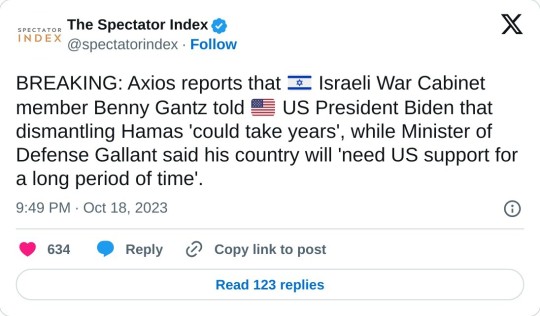
Seems to me the Israel has seen what Ukraine has received in just a year and a half of war. They're done receiving a paltry 3.8 billion every year and now prepared to drag out the conflict and I can't say I blame with Biden proposing a 100 billion package for both Ukraine and Israel. This will stretch America too thin as far as funding in concerned. Cracks are already showing
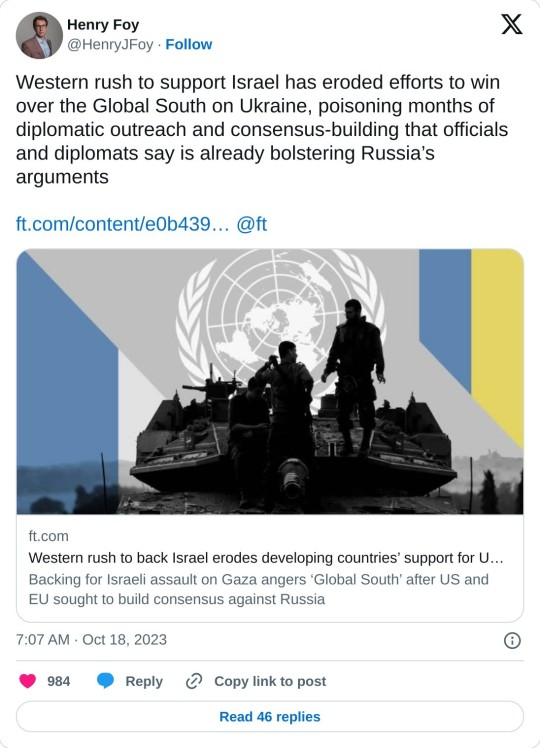
There are parts of the US government that is unhappy that the Ukraine war is losing attention. During the Ukraine war, you had parts of the government that wanted focus to shift from Russia to China. Because of that, the US government has spent the past year alternating between hostility to Russia and threatening to go to war with China over Taiwan. When Niger expelled France from within its borders, America was preparing to join that conflict until Mali and Burkina Faso declared they would fight with Niger. Now they're entering a third front in West Asia. In short, the mighty empire is expending a lot of resources right now and it is not the threat it was when it invaded Iraq and Afghanistan in the early 2000s.
At any rate, the ground invasion of Gaza won't go the way Israel and America hopes it will
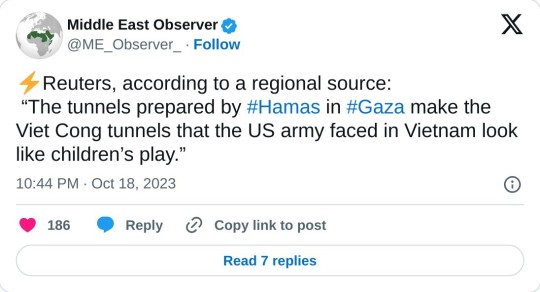
The coalition of Palestinian resistance fighters are still patiently waiting for the IDF to come meet them. Their allies aren't backing down either


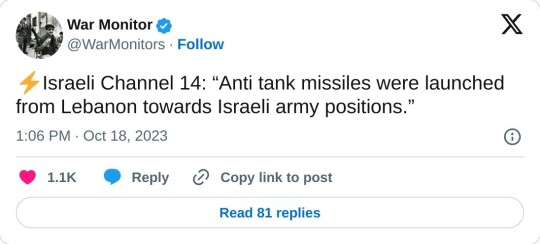
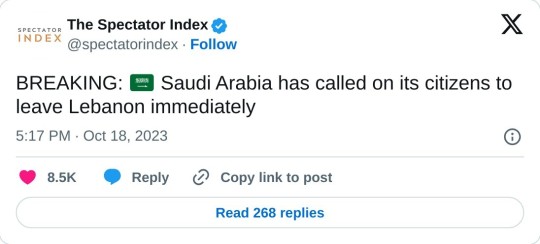
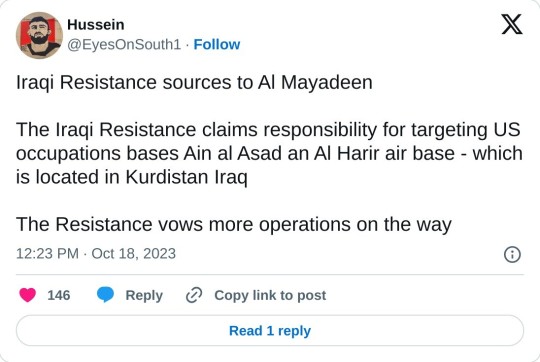
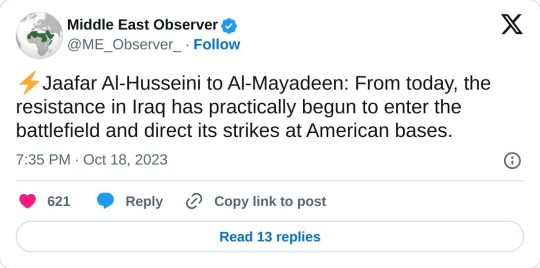
The reason I keep making these posts is to remind people that, while the genocide of the people of Gaza is horrifying, the war for the liberation of Palestine has not yet been lost.
Do not lose hope. From the river to sea, Palestine WILL be free
1K notes
·
View notes
Text
One of the best scenes from the HBO miniseries, Band of Brothers.
Lieutenant Dick Winters (Damian Lewis) and the men of Easy Company, 101st Airborne Division, load into their aircraft and fly to Nazi occupied France to be the spearhead for the invasion of Normandy.
By the early morning hours of June 6, 1944, thousands of American and British paratroopers would be the first allied troops to land in France and help spearhead the D-Day invasion.
#band of brothers#movies#video#world war 2#wwii#dday#normandy#operation overlord#us army#101st airborne#easy company#dick winters#damian lewis#military
218 notes
·
View notes
Text










Operation Overlord Normandy, France D-Day: June 6, 1944
#History#D-Day#D-Day + 80 Years#D-Day 80#World War II#WWII#Second World War#Operation Overlord#Normandy Landings#Battle of Normandy#Allied Invasion of France#France#Normandy#Military History#80th Anniversary of D-Day
168 notes
·
View notes
Text
At the 11th hour on the 11th day of the 11th month of 1918, the Great War ends. At 5 a.m. that morning, Germany, bereft of manpower and supplies and faced with imminent invasion, signed an armistice agreement with the Allies in a railroad car outside Compiégne, France.


70 notes
·
View notes
Text
D-DAY ANNIVERSARY
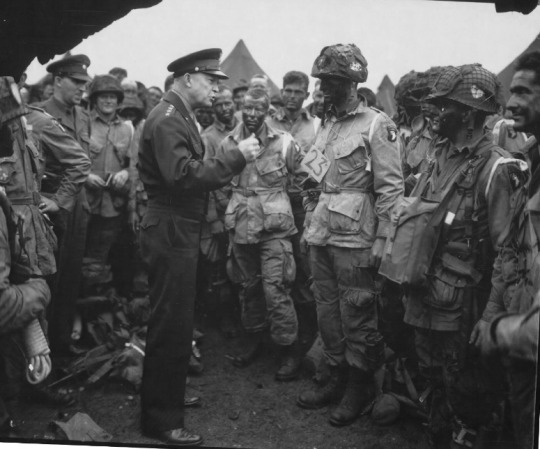
“You are about to embark upon the Great Crusade, toward which we have striven these many months. The eyes of the world are upon you. The hopes and prayers of liberty-loving people everywhere march with you…” With these words, Gen. Dwight D. Eisenhower issued the “Order of the Day” just before the 1944 Allied assault on Normandy Beach. It’s been 80 years since that historic day, and less than one percent of Americans who served in WWII are still alive. However, the impact of their service and sacrifice will live on forever.
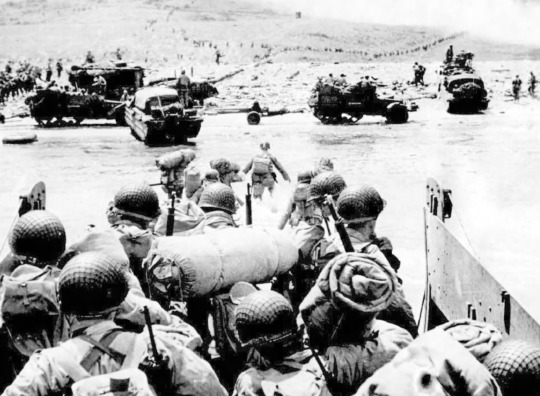
Code named Operation Overlord, planning for D-Day began after France fell to the Nazis in 1940. It involved Allies from several countries and was the largest amphibious invasion in military history. As H-Hour approached (5:30 a.m. local time) on June 6, 1944, demolition teams had already blasted out underwater obstacles planted by German forces. Rangers were already scaling the cliffs to knock out coastal guns, and American and British airborne divisions had been dropped in hedgerows behind the beaches overnight. Soon, the first waves of Infantry would hit the beach.
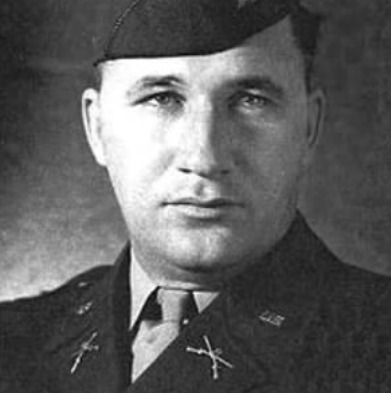
Leonard T. Schroeder, Jr. served in the 2nd Battalion, 8th Infantry, Fourth Division, where he was the commanding officer of Company F.
He has the distinction of being the first man ashore at Utah Beach, the first beachhead, landing fewer than 60 seconds after H-Hour. Recalling the day, Schroeder said that Allied aircraft had bombed the beach heavily, creating craters that could be used as cover. Some of those craters were offshore and hidden by water. When Schroeder’s landing craft pulled ashore, he jumped off and into a water-filled crater six feet deep. He came up sputtering and struggled to rush ashore. Working his way up the beach, he was wounded by shrapnel but continued to fight. He commanded his company for three hours before collapsing into unconsciousness. He woke up at an aid station and was later evacuated to England. Schroeder received the Silver Star.
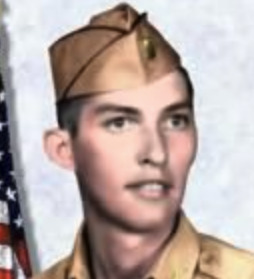
Pvt. Carlton W. Barrett served in the 18th Infantry, 1st Infantry Division and participated in the Normandy Invasion. His unit was in the third wave of Allied soldiers to come ashore at Omaha Beach, landing at about 10:00 a.m. Germans had planted mines on the beach about a foot apart, and the beach was strewn with bodies of soldiers. Barrett landed under heavy enemy fire, wading through neck-deep water. He noticed fellow soldiers around him floundering in the water and rushed to save them from drowning. Once on the beach, Barrett carried dispatches back and forth along the exposed beach while under heavy fire. He also carried wounded soldiers to an offshore evacuation boat. For his dauntless courage, Barrett was awarded the Medal of Honor.

The Allies landed over 160,000 troops on June 6, 1944, with an estimated 10,000 casualties, more than half of which were American. Today, a visit to the Normandy American Cemetery is the final resting place for 9,387 Americans and a sobering reminder of selfless service and the ultimate sacrifice made 80 years ago.
84 notes
·
View notes
Text
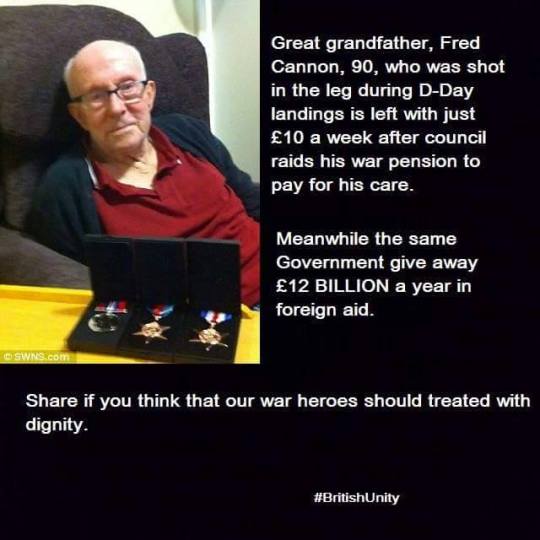

Indeed, our war heroes need to be treated with dignity and respect.
#D-Day#Normandy landings#Allied invasion#France#UK#British stamps#6 June 1944#injured veterans#On this day#Sword Beach#Juno Beach#war heroes#honour#sacrifice
19 notes
·
View notes
Text
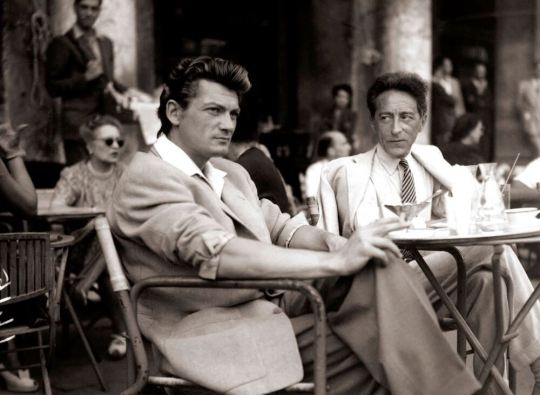
"Life is unfair. I got nothing but the best."
Jean Marais
He was the muse and lover of the great artist/writer/filmmaker Jean Cocteau, plus he was an actor of considerable skill and certain charisma, a film and theatre director, writer, and visual artist.
Marais was born Jean-Alfred Villain-Marais in Cherbourg to a shoplifting, sometimes violent, sometimes loving mother. He was always drawn to drama of all sorts. Expelled from school when, to amuse his friends, Marais dressed as a girl and flirted with a male teacher. As a kid, Marais worked various jobs including newspaper boy, photographer, and sketch artist.
In 1937, 24-year-old Marais first met the 48-year-old Cocteau. They became acquainted when Marais auditioned for a role in a revival of Cocteau's play OEDIPE-ROI. Cocteau cast Marais for the role, plus he fell madly in love with the young actor.
Marais and Cocteau became partners in life and art. Marais nudged Cocteau to write a special screenplay for him to play the lead role. L'ETERNEL RETOUR (1943) was that film and it became a commercial success and a critical triumph for both the filmmaker and its star.
Marais continued to act in films and plays while the Nazis occupied France during World War II. Both Cocteau and Marais stayed in Paris during the occupation despite the very real danger of having nearly everyone in the city knowing that they were a gay couple. Cocteau had some powerful connections who protected them, even after Marais punched a Vichy critic for writing a bad review of one of Cocteau's plays. Their names were posted in the French press, which was controlled by those nasty Nazis, but because of Cocteau's friends in high places, they avoided being arrested and sent to a concentration camp.
Marais tried to join the Resistance, but he was rejected for being gay and also because of his reputation for speaking candidly. So instead, he volunteered for France's Second Armored Division after the liberation of Paris and drove trucks carrying fuel and ammunition to the frontlines during the Allied invasion of Germany. Marais was eventually awarded the Croix de Guerre for his bravery during his wartime service.
During the Nazi occupation, there were other gay couples in Paris, but it was unusual for any of them to be openly living together, working together, and behaving like a married couple. They were especially brave, even maybe reckless.
After the war in 1946, L'ETERNEL RETOUR was released in the USA introducing Marais to American film fans. Photographs of his handsome face and hot body became a popular pin-up for teenage girls and for gay fans slyly aware of his real relationship with Cocteau.
Cocteau didn't consider himself a filmmaker, but poet, and LA BELLE ET LA BETE (1946), his film masterpiece, plays like a visual poem in which Marais plays three roles.
Although Marais and Cocteau's romance cooled down by the late 1940s, they remained the closest of friends until Cocteau's final credits rolled for good in 1963. After Cocteau died, Marais stated: "I bitterly regret not having spent all of my life serving Cocteau instead of worrying about my own career." Marais enjoyed that career; it lasted more than six decades. His blond, classical good looks and skillful acting can be experienced in more than 100 films and television shows.
In the 1950s, Marais fell in love with American dancer and choreographer George Reich (1926 – 2013). Reich resembled Marais; both were blonde, athletic, and unworldly handsome. Reich was the first classically trained dancer to organize an American-style ballet company in France, The Ballet HO. He danced at the Lido de Paris, the Moulin Rouge, The Ballet De Paris, and in the MGM musical film THE GLASS SLIPPER (1955) with Leslie Caron, plus he provided the choreography for Marlene Dietrich, Joséphine Baker, and Edith Piaf's nightclub acts. Reich and Marais were a couple for more than a decade.
Marais sought to reconcile romantically with Cocteau at the end of the great artist's life, but rebuffed and frustrated, he returned to his old opium habit. Marais had been legally adopted by Cocteau so that he would be his inheritor.
Like Cocteau, Marais had no problem finding the company of handsome younger men. For one of them, Serge Ayala (1943 – 2012), he helped find acting work and legally adopted him as a son, taking the name Serge Villain-Marais. This adopted son became a singer and an actor. Marais enjoyed life with his protégé until he took his final curtain call in 1998, gone from heart failure, just like his former, fabulous, famous lover. The adopted son took his own life in 2012 at 69 years old after troubling inheritance litigation with Marais's estate left him lonely and depressed.
Marais's life story served as the inspiration for François Truffaut's film THE LAST METRO (1980).
Photo: Marais et Cocteau à la terrasse d'un café de Venise, lors de la huitième Mostra de Venise, 1947
31 notes
·
View notes
Text
Princess Anne reading the memoirs of her husbands uncle, Sub-Lieutenant Keith Symons, who at aged 20 was in command of three landing crafts at gold beach on the first wave of D-Day, at the Commonwealth War Graves Commissions ‘Great Vigil’ at Bayeux War Cemetery in France on 5th June 2024.
The full speech:
At 04.15 hours on 5th June 1944, General Eisenhower, Supreme Commander Allied Forces, took the momentous decision to launch Operation overlord - what we now call D-Day - the largest sea and airborne invasion the world has ever seen. After 5 years of war, all that time training and waiting, who knows what those Sailors, Soldiers and Airmen felt. 80 years ago today, charged with storming the Normandy coastline and beginning the campaign to free Western Europe from Nazi tyranny.
One of those sailors was my husband's uncle, Sub-Lieutenant Keith Symons who, at the age of 20 was in command of three landing craft at Gold Beach in the first wave on D-Day.
Recalling in his memoirs the evening of 5th June he wrote:
"At last it was time for our briefing. Our confidence was dented by predictions that casualties in the first wave were likely to be heavy. Everyone was quite subdued, but it was all very matter-of-fact. They were in those days. After supper we sat around making light conversation and listening to the chaplain playing his violin.
My cabin companion was a Captain in the Green Howards, a charming man who had been a solicitor before the war. We talked about what we would do when the war was over. Sadly he was killed in France only a few weeks later."
Bayeux was close to the landing beaches and it was the first city to be liberated by the British on 7th June. The City's hospitals were soon full of the wounded from the surrounding battlefield. For those who could not be saved, this was their final resting place.
It is the largest Commonwealth cemetery of the Second World War in France and contains four thousand one hundred and forty allied graves. It is my honour as President of the Commonwealth War Graves Commission to continue to protect their legacy.
The epitaphs on the headstones here capture the grief of those who loved these men. One mother's words are:
"HE IS NOT DEAD WHOSE MEMORY LIVES IN HEARTS THAT KNOW AND LOVED HIM."
80 years on, let their memory still live on in our hearts.
#ill replace this with a better recording when i get chance#thank you random Twitter user 😅#PDA PDA PDA 😭😭😭#my heart#princess anne#princess royal#tim laurence#timothy laurence
81 notes
·
View notes
Text
Morgan Stephens at Daily Kos:
When White House reporters asked President Donald Trump on Monday if Russian President Vladimir Putin is a “dictator,” the usually bombastic Trump was suddenly demure. “I don’t use those words lightly,” Trump said. Meanwhile, Trump had no problem smearing Ukrainian President Volodymyr Zelenskyy by calling him a “dictator” on Truth Social in a Feb. 19 post. Trump’s newfound restraint comes exactly three years after Russia invaded the sovereign nation of Ukraine on Feb. 24, 2022. French President Emmanuel Macron is visiting Washington, D.C., in an effort to negotiate more financial, humanitarian, and military support for the beleaguered ally. During a bilateral meeting in the Oval Office on Monday, Macron pushed back against Trump’s misunderstanding of France funding Ukraine’s defense. “Europe is loaning the money to Ukraine. They get their money back,” said Trump. “No, in fact, to be frank, we paid, we paid 60% of the total effort,” said Macron. France, along with other NATO member nations, is seeking reassurance that the U.S. will continue to support Ukraine’s fight against Russia. Yet Trump seems content to spout lies and brag about how he’s helping the war-tattered country just by existing. “We’re helping Ukraine like nobody’s ever helped Ukraine before,” he blathered while sitting next to Macron in the Oval Office. “If I didn’t become president, Ukraine would right now still be at a level where there would be no even thinking about a peace. And it was—it’s a sad thing that this happened. This would've never happened, this war if I were president.”
Three years after Russia’s invasion of Ukraine and territorial theft of Ukrainian land, Kremlin Puppet Donald Trump continues to simp for Russian dictator Vladimir Putin.
See Also:
Wake Up To Politics: Trump Rewrites History as Ukraine War Marks 3rd Anniversary
#Russian Invasion of Ukraine#Donald Trump#Vladimir Putin#US/Russia Relations#US/Ukraine Relations#Russia#Ukraine#Emmanuel Macron#NATO#US/France Relations#France
27 notes
·
View notes